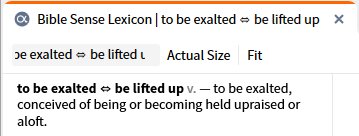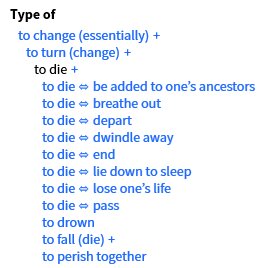Another tip of the day (TOTD) series for Logos/Verbum 10. They will be short and often drawn from forum posts. Feel free to ask questions and/or suggest forum posts you'd like to see included. Adding comments about the behavior on mobile and web apps would be appreciated by your fellow forumites. A search for "L/V 10+ Tip of the Day site:community.logos.com" on Google should bring the tips up as should this Reading List within the application.
This tip is inspired by the forum post: Something I Should Know After All These Years But Don't - Logos Forums
It is the mathematical symbol for equivalence, but in the context of Bible Sense Lexicon is best read as "conceived of as".

It's not that the two senses are equivalent (in fact, there is a sense for "to be lifted up" that is distinct), but that the sense before the ⇔ is expressed using the sense/phrase after it.
You can hopefully see this more clearly with a different sense, to die (specifically its children):

Various euphemisms ("fall asleep", "go to one's fathers") mean "to die", but are expressed with a different word. We don't want to conflate those with the sense "to die" (and lose those distinctions), but we also don't merge to merge them with the sense meaning to literally go to sleep. So it's written as "to die ⇔ lie down to sleep" meaning that the sense of the word is "to die", but it's expressed with a word or phrase that often has a different literal surface meaning.
In the OP, the word being used could have a literal sense of physically lifting something up, but in context is being used to figuratively mean "to be exalted".